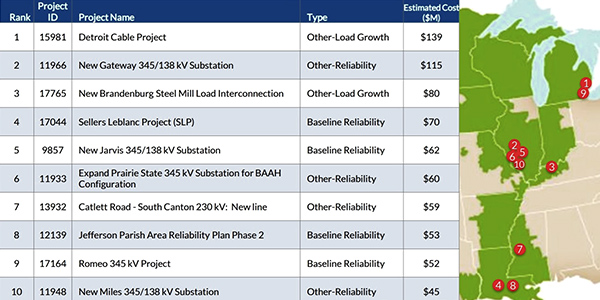By Amanda Durish Cook
INDIANAPOLIS — MISO’s Board of Directors on Thursday unanimously approved a $4 billion transmission portfolio consisting of 480 projects.
The 2019 MISO Transmission Expansion Plan (MTEP) was passed to the board by the Planning Advisory Committee without any suggested edits. (See MTEP 19 Advances to MISO Board Committee.)
“This is the largest MTEP cycle to-date, excluding MISO’s 2011 [multi-value project] portfolio,” Executive Director of System Planning Aubrey Johnson said during a Dec. 10 meeting of the board’s System Planning Committee.
MTEP 19 Highlights
Six of MTEP 19’s top 10 most expensive projects are clustered near the Detroit and St. Louis areas.
Johnson said the Detroit area is experiencing enough load growth to warrant MTEP 19’s most expensive project, which includes several miles of aboveground 230-kV and underground 120-kV circuits and a pair of substations at $139 million.
ITC Transmission said several Detroit-area 120-kV underground cables are projected to overload in the future and the project will allow connection with DTE Electric loads in the city.
Other than the Detroit projects, nearly all the priciest projects are needed for reliability purposes.
MTEP 19 contains MISO and MISO, PJM Poised for 1st Major Interregional Project.)
However, formal approval of the interregional project must wait until at least March, along with MISO’s first-ever storage-as-transmission asset (SATA) project. The RTO has yet to finalize rules to govern either project.
In the case of the MEP, MISO is still working on a cost allocation ruleset that can win Despite Pushback, MISO Pursuing TO-only SATA.)
MISO on Thursday filed a plan with FERC to permit storage facilities to provide transmission services (ER20-588). The RTO characterized the proposal as a “fundamental first step forward for the use of storage resources to maximize the reliability and efficiency of the electric system.”
The SATA plan would require that the assets be used only for transmission purposes, barring them from simultaneous participation in energy markets, but the 800-page filing contains a promise that MISO and its stakeholder community would soon begin exploring how storage devices could serve both transmission and market functions.
“Accepting these proposed revisions will allow for the immediate adoption of storage facilities to serve a transmission function in MISO. And in early 2020, MISO and its stakeholders intend to begin the process of addressing the issues related to using storage as both transmission assets and to provide market services,” the RTO told the commission.
Disagreement on Michigan Interconnection Project
Like last year, a stakeholder is once again disputing a small Michigan interconnection project for resembling distribution.
DTE Energy has said the $8.6 million, 120-kV city of Croswell interconnection project in eastern Michigan is more distribution than transmission in nature and should not be included in this year’s transmission buildout package. The company’s Nick Griffin said the line is “clearly radial” in nature.
Johnson said MISO analysis indicated the project should be classified as a transmission line.
“Our recommendation is to leave the project in inclusion in Appendix A,” Johnson told board members in November.
Johnson said the situation is similar to MTEP 18’s Morenci project, which Consumers Energy disputed. (See Michigan Regulators Intercede in MTEP Complaint.) The Michigan Public Service Commission has since reviewed the characteristics of the $21 million, 138-kV line near the Michigan-Ohio border and last month classified it as distribution, dropping it from MTEP eligibility.
“However, that determination is open to rehearing,” Johnson said.
Griffin said it would be “prudent” for MISO to delay approval of the Croswell line until FERC weighs in on the Morenci project. The project was nevertheless included in MTEP 19 approval.
Helena-to-Hampton Corners Heartburn
Johnson said MISO still stands firm that the Helena-to-Hampton Corners project cannot pass necessary robustness testing to be included as a MEP in this year’s package.
Renewable generation proponents had urged MISO to include the $36.1 million, 345-kV project, originally identified in this year’s Market Congestion Planning Study. The project was set to solve congestion in southern Minnesota at a 4.22:1 benefit-to-cost ratio, but MISO said the project quickly lost value once forecasted wind generation was removed from the equation.






